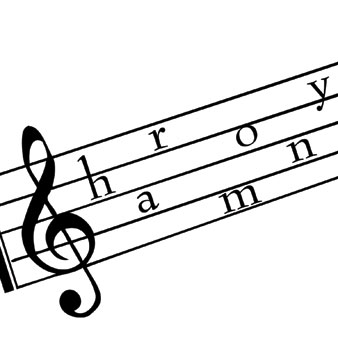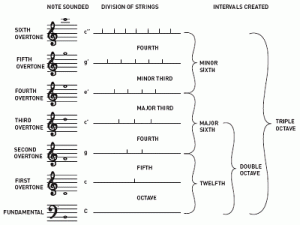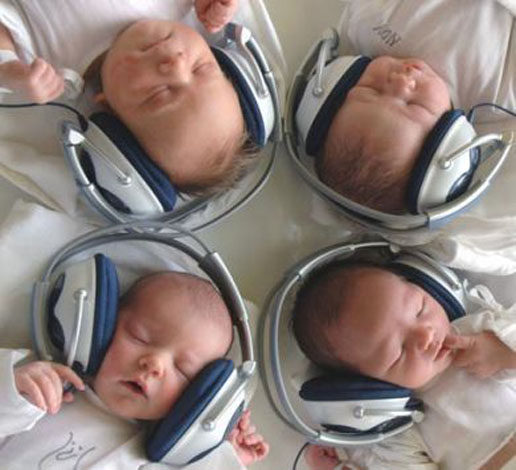Music is inherent to nature, it (in a form) predates humans – birds have always sang as communication as well as the tunes of the humpback whale and the sonar of dolphins. The very universe itself down to the vibrational waves of motion that could be considered musical and harmonious.

Music is interwoven into what is means to be human. It was Nietzsche who said ‘we listen to music with our muscles’. We many times unconsciously tap our feet, sing along, become expressive and move to music
 Nietzsche
Nietzsche
Although a relatively small proportion of the population are “musicians” in comparison to other careers, music touches all part of our lives. I do not know a single person who doesn’t like / listen to music – it is as essential to society as eating and language. I’ve grown up around music, I have vivid childhood memories being with my mother as she was playing the likes of Five Star on vinyl to me, I remember my time as a percussionist in a youth orchestra like it was yesterday, I still know word for word lyrics of tracks that I’ve not heard for 10s of years. As a DJ I’ve experienced first hand the power music has had on the collective consciousness, its something very organic – its no wonder that DJs / producers / singers / artists are sometimes given an almost godlike status in the minds of the recipient – music is something special that can touch the very nature and essence of what it is to be human.
Music has had a huge influence in the forming of societies, in communication, therapy, story telling, it was used by soldiers to march in unison, even Albert Einstein was utilizing music into his experiments and today its used to entice shoppers in the supermarket [1] Think of the number of universities out there that offer courses in music compared to those that offer courses in food. There has not been a single recorded culture in history where music has not played a part in their society. Archeologists have discovered that the first music making tools could be dated back to 82, 000 years ago through the discovery of bone flutes [2]. These flutes could be carbon dated back due to being made out of bone being able to remain preserved until today – wooden instruments would have most likely predated these by many thousands of years [3]
The music industry is currently worth $168 billion dollars a year [4] higher than even the pharmaceutical industry which shows its importance in our lives.
What defines & differentiates music from noise?
The exact definition of what music is varies greatly between people and has long been a point of debate between musicians, scientists and philosophers alike. Maybe that is one of the powers of music – that it means so many different things to many different people.
Music in its base form can be defined as “The art or science of combining vocal or instrumental sounds (or both) to produce beauty of form, harmony, and expression of emotion” [oxford dictionary]. The first societies to record this state of harmony and talk about the powers & uses of music beyond enjoyment were the ancient Egyptians and Greeks. They both recognised music’s state of harmony as a prerequisite for beauty, which were inherent to the creator of good which was central to life, the cycles of nature and the cosmic order of society [5][6]

This harmony was central to the ancient Egyptians & Greeks – they were the first known to question as to why music played such a role in our lives [8]
These Egyptian and Greek philosophers used music as therapy and attributed this power to the Isis & Hermes respectively


The strings of the lyre of were seen as nerves and the musician the spirit.
It was Pythagorus who was the first to mathematically interpret music. He created what was known as the harmonic ratio through string tension, this lead to the creation of the octaves. He gave musical instruments 7 strings which were related to the (then known) 7 planets of our solar system and the interconnectedness of the universe.


Musical harmony was also central to the early eastern philosophers, where beauty and harmony were harmonised as ying and yang (intellect and emotion) [6]
Moving towards the present day what can be seen as the powers of music beyond its obvious entertainment value:
Influence
No matter what age of the recipient music is understandable by all, it transcends the barriers of language and societies, its a common experience – no matter where you’re from everyone has a basic understanding – its one of the many reasons why musicians are so highly exalted.
Advertising has taken advantage of this using music to draw people into purchasing their products. Marketing has gone into great depths to investigate the different types of music and how they effect people – supermarkets player slower music so people move around the store slower and put more items in their trolleys.
Collaboration
Music has formed a major role in the forming of societies in the creation of bonding & identity of communities. Music was used in various religious rites and in the gathering of communities, the military formations of age old used the beat of the drum as a means of establishing the behavioral coherence of the unit to get them to step to the beat. Many consider that being wired to music in this way gave us an evolutionary advantage in bringing out cooperation and community organisation and thereby promoting community survival. [3] This primary function of music in collaboration has been lost to degree but can be seen every time we go to a large concert, club or musical event. The power of music to bring people together and act in some sort of synchronicity can be seen today in concerts and club nights everyday with masses of people from all walks of life dancing in collaboration to the music. Music is proven to be able to coordinate the the thinking of individuals in a group [9]
Medicine
The therapeutic use of music has been used since the Egyptians & Greeks and is used today in a wide range of disorders from pain management to psychotherapeutic intervention for conditions like addiction and in child development [10]
Patients with Parkinson’s Disease have been shown to overcome their symptoms when exposed to a precise rhythmic tempo. Music has been shown to reduce symptoms of Tourette’s Syndrome sufferers whilst other forms of music have exacerbated their symptoms.
Music is known to act positively on alpha brain waves, oxygenation and on the heart rate; it improves tolerance to pain
Concentration
There is a link between athletic performance and the music, just think of how much you use music during exercise – music definitely gives the focus needed to concentrate properly during exercise and any repetitive and mundane tasks. It has been shown that the optimum speed of music is 120 – 140 beats per minute [11]
Music reduces the perception how hard you’re working by up to 10% and was used by up to half the people taking part in the London marathon to concentrate on whilst running
Stress Reduction
Music has been shown to significantly reduce heart rates & blood pressure for those who have undergone surgery. Studies have also shown that music therapy reduced psychological stress in a study of 236 pregnant women in Taiwan [12]
Emotional
Music has the ability to take us along with it to places of joy, sadness, beauty, and darkness. Music is able to touch the inner soul and invoke memories. Hearing an amazing piece of music for the first time is able to bring us to tears.
The emotional power of music is the most obvious of the powers. It is its ability to change affect mood which it is why it has been used as therapy to treat depression for thousands of years
Spiritual
Music is given a spiritual personification and it can be seen why. Music transcends the physical and has been known to touch the very spirit. It has had a major use in all religions from the singing of Christian hymms to the meditative dance of the Sufis.
Music has been used in religious rites for millennia in the induction of trance formation. It seems that once we have fully given ourselves over to the music has the ability to take us to states of consciousness which are considered spiritual and closer to god.
There is a scene in Andrey Tarkovskiy’s 1979 movie The Stalker which quiet poiniently asks the question of the spiritual nature of music. This is what was said:
 The Stalker
The Stalker
“Here you were talking about the meaning of life… Let’s take music… It has the least connection with reality as such. Or, more precisely, if there is a connection, it is just through pure sound, mechanically, without ideas or associations.
“Nevertheless, music, by some miracle, penetrates into our very soul. What is it then that resonates within us in response to the noise produced by the harmonies? And transforms it for us into a source of elevated enjoyment, and unites us and stirs us so? What’s it all for? And who needs it?… You might say: no one needs it and it’s just for nothing. But no, that’s unlikely. For everything, in the final analysis, has a meaning. A meaning and a purpose.”
Its a very difficult question to answer. How is its that music affects us in such an innate way – it doesn’t matter if its a 3 month old baby listening – there is an built in natural innate understanding (and enjoyment) from music in all of us much like how our taste buds like sweet things and hate sour. The understanding of of music is not something that is learned it could be built into our biology.

The Biological Basis of Musics Effects and Music Cognition
How and why does music have such profound effects on us? This question has become easier to answer through the development of the discipline of cognitive musicology. Cognitive musicology is a branch of cognitive science concerned with computationally modeling music knowledge with a goal of understanding both music and cognition. Cognitive science is an emerging discipline or better yet set of disciplines that encompasses philosophy, psychology, sociology, neuroscience to name a few aimed at understanding the mind and its processes
Cognitive scientists have pushed to explain how behaviour and mental functions work and react. Cognitive musicology aims to understand the musical mind, the musical habits of the mind and the mental representation of music both biologically and socially. [11]
Having its roots in such a wide range of disciplines there are many differing views within cognitive musicology as to why music is so important to us. Many believe that music being important to us is an evolutionary adaption. Young infants show the capacity for complex musical understanding, this capacity is an integral part of the human mind. If you look at evolution as purely a physical phenomenon then humans have not evolved in the past 80,000 years – physically down to the very nature of our cells and brain capacity we were able to function in the exactly was then as we are today [8]. If you were to include the cognitive and cultural then we are continually evolving and the society our children will live in will have different perceptions that we have today. Our perceptions of the planet is not correct representation to how to the world actually is – its the world how it relates to us. Just think of insects – they outnumber humans on the planet in both numbers and biomass and yet they for the most part see the planet in the infrared spectrum only, this doesn’t make their view of the world more correct.
There is another belief amongst cognitive scientists that music has importance in our lives because it has allowed the integration of many different functional domains. Music has had a role in social interaction and in the development & socialisation on infants. Like the development of language music is a property communities and like language is has shaped cultures. Music has played a role in conflict resolution, trans-generational communication, social cohesion and group coordination.
Other cognitive scientists believe that music is simply a functionality of the non-adaptive (does not serve a purpose) pleasure seeking. We are wired to gain pleasure from things that give us some sort of survival advantage such as eating and sex. But there are many things that give us pleasure that we do not give us any survival based advantage such as drinking alcohol, smoking and drug taking. There is a belief that music can be put into this bracket, but the easiest way to see it is to see how long it has been around – as shown earlier music has been around as long as the use of language, so it can be deduced that music does play some sort of survival based role.[2]
Cognitive scientists have also deduced what happens in our heads when the brain hears music. To put in basic terms the left hemisphere of the brain deal with rhythms and the right with pitch and melody. Music is processed by our brains as more than just sound visual perception is also used in music. The emotional limbic system which lies below the cerebral cortex is involved in music processing. In terms of the number of distinct areas of the brain that light up in an MRI scan – more areas light up when stimulated my music than any other stimuli.
Conclusions
I have only touched in this article some of the ways that music is important in our lives. This is no means a definite answer to the hows and whys, but opens up some of the possibilities for more in depth discussion on this website.
One thing is for sure and does not need cognitive science to deduce is that music is important to us and an integral part of what makes us human. This is shown by its many uses in forming societies in the past, its multifaceted nature, the many parts of the brain that music activates when we listen to it, its potential for bringing people together and its potential uses in therapy.
We live on a planet / in a universe that is moving forward (not necessarily in a straight line) towards something – call it evolution, or bringing order out of chaos or reaching harmony. This harmony and vibration is inherent throughout the universe. Just like Pythagoras basing the octaves on the planets of our solar system music is an expression of the harmonics and natural rhythms of the universe.
The Egyptians and Greeks were the first (recorded) to look into the functional ability of music beyond that of enjoyment, today these reasons have changed but music now plays as much if not more of a role to us as it did back then. Instant accessibility is part the reason for this. The cognitive sciences are beginning to deduce exactly how music affects us and the potential for new forms of therapy to come out of this are huge.
You don’t need science to tell you that music important, it is something that is inherent and wired into us just like the need to eat.
by Tendai – Cognitive Space
References
[1] The Mysteries of Music, Sarah Silverstri – http://www.yuobserver.com/mobile/science-health/the-mysteries-of-music-1.2638279
[2] Music, cognition, culture and evolution, Ian Cross, Annals of the New York Academy of Sciences Vol 930, 2001, pp 28-42.
[3] Music In Your Mind, Eckart O. Altenmüller, Scientific American Mind, January 2004
[4] How Much Is the Music Industry Really Worth? Try $168 Billion…, Digital Music News, http://www.digitalmusicnews.com/stories/090611industry
[5] Oxford Dictionary
[6] The Secret Teachings of All Ages, Manly P. Hall, Penguin Books
[7] The Influence of Music on Self and Society – Values in Music in Eastern and Western Cultures, David Eaton, July 2003. True Parents, http://www.tparents.org/library/unification/talks/eaton/eaton_influence.htm
[8] Music – A Divine Art, Theosophy, Vol. 42, No. 4, February, 1954, Pages 175-179
[9] Music & The Brain, Norman M. Weinberger, Scientific American, November 2004
[10] Music as a Therapeutic Modality, The Journal of the American Medical Association, September 19, 1953, Vol 153, No. 3
[11] How Music Affects the Brain and How You Can Use It to Your Advantage, Thorin Klowsowski – http://lifehacker.com/5865032/how-music-affects-the-brain-and-how-you-can-use-it-to-your-advantage
[12] The Power of Music, Brain, 2006, Vol 129
[13] Is music an evolutionary adaptation?, David Huron, Annals of the New York Academy of Sciences, Vol. 930, pp. 43-61.